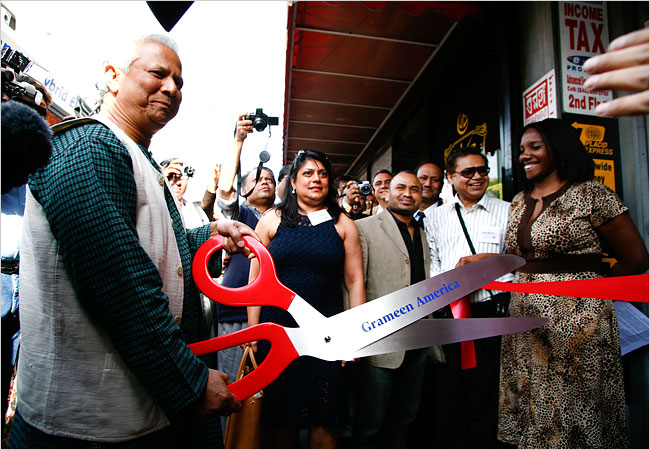Every four years we, as privileged citizens of the United States, get to participate in the world’s most highly publicized election. This cycle it was an HBO-worthy fight set up to determine how to best ‘serve the people’ as we continue to rebound from one of the worst economic collapses in our country’s history. In the left corner we had the government, who plans to win this fight by taking money from our paychecks and use it to provide a safety net of services to the poorest of people. In the right corner we have the private sector, who believes that by growing as large as possible its benefits will end up getting to those who deserve it even if growing may involve stepping on those same people’s heads. I am of the mindset that government is too political to work efficiently and the private sector does not care about people below the poverty line, so I am not putting my money on either side to get the job done.
Instead, I am focusing on something different; something that has all the freedoms, innovation, and opportunity of the private sector with benefits to the people that rival government programs. Something that lets me participate daily with the work I pursue, the products I buy, and the investments I make rather than only letting me cast a single vote once every four years. Something that doesn’t prohibit, but rather supports, the important roles that both the government and private sector play in our ever-evolving, interconnected global society. And, something that has proven it has the capability to outperform both government and the private sector when it comes to important issue issues like improving educational opportunities, promoting gender equality, and the alleviating poverty.
This something is social enterprise, and it is commonly defined as an organization driven by a social mission that uses market-based strategies to achieve a social purpose. Social enterprises are innovative, sustainable, high-performing entities that operate without the red tape of politics or the greed of the private sector. These entities can look or feel like a private sector company or a traditional non-profit at first glance, but once you take a closer look you realize there is more to them. They value money not to get rich but because they know that without a sustainable source of revenue they cannot fulfill their mission. They operate with big brains and big hearts to make the difficult decisions required for lasting change, and they focus on measuring the impact they have because they know it is the only way to truly understand and build upon it.
One example of a high-impact social enterprise is Grameen America, an organization that provides financial services to low-income entrepreneurs in the United States. The organization operates against the conventional wisdom that borrowers are too risky to lend to unless they can provide collateral to cover their loan and that loans need to be of a certain size in order to be profitable. By tweaking the traditional lending model used by most domestic banks, Grameen America is able to provide loans to struggling entrepreneurs rather than ignore their potential as customers. Loans provided through Grameen America empower its borrowers, a group that is entirely made up of women, to start or grow their own businesses on the road to economic independence.
Another example of an innovative social enterprise is Massachusetts-based clothing manufacturer MoJo. MoJo, short for Moms and Jobs, is a socially responsible apparel company who focuses on hiring low-income single moms and providing them with skills training, above-minimum wage employment, and free childcare in order to break the cycle of poverty. Since child care in the United States costs more than minimum wage pays, MoJo provides a unique opportunity for the key demographic of single moms to lift themselves and their families over the poverty line. By manufacturing apparel for top musical artists such as Dave Matthews, Fortune 500 companies, and top Universities, MoJo will grow its operations as it expands to Oakland, Detroit, and New Orleans in upcoming years. Because of the key role that MoJo’s social mission and beneficiaries play in its model, growing the company means growing the impact that it is able to have.
Unlike government hand-out programs or the nonprofit sector, social enterprises know that poor people are not poor because they are stupid or lazy, but rather because they lack opportunities to overcome their socio-economic condition. They also know that handouts aren’t anything more than ‘band-aids’ to poverty’s complex issues and that they can have the biggest impact by providing the poor with tools, like credit and strategic employment, that can empower them to help themselves. And despite all the hype and attention that high performance social enterprises receive, they know that they can only do so much without the support and cooperation of both the governments and private sectors they operate within.
For Grameen America and MoJo, the role of partnerships with both government and private sectors has played a key role in their success. Thanks to the US Treasury Department, Grameen America is certified as a Community Development Financial Institution. This certification means that mainstream banks are more incentivized to provide capital to Grameen America as they receive credit through the Community Reinvestment Act, a government initiative to encourage lending institutions to meet the needs of low-income communities, to do so. A private sector partnership between MoJo and Polartec, one of the world’s largest fleece manufacturers, led to a donated stock of raw materials for MoJo train its initial workforce. Polartec also provides MoJo with access to some of the best quality fleece on the market which helps them maintain top quality and customer appeal with their products. Without the support of an organization like Polartec, the obstacles in getting to a level of production quality and operating efficiency required to run a successful manufacturing company in the US would have been significantly greater for MoJo.
The future looks bright for a continued effort by the government and private sector to increase their roles in the launching, financing, and supporting social enterprises. New legal structures such as B Corporations and Low-Profit Limited Liability Companies (L3C) are gaining traction as ways social entrepreneurs can receive tax benefits for their enterprises due to the social and environmental focus their mission and operations. Innovative government initiatives such as the Jumpstart Our Business Startups (JOBS) Act, which would allow startups to sell small stakes of their company online to unaccredited investors, are being seen as a way to increase access to capital that startups (including social enterprises) require to turn their ideas into actions. The private sector is also getting involved, with big names like Goldman Sachs investing in social impact bonds that aim to decrease the recidivism rate of youth in New York City prisons and younger organizations like Microplace allowing everyday investors to earn a return by buying Community Investment (CI) Notes that lend to organizations empowering women both domestically and abroad.
I want a future where government and private sector work together to solve the socio-economic challenges that our country faces every day, rather than spending time blaming and placing roadblocks for each other. We need a leader in the White House who understands that poverty isn’t a result of a lack of hard work, and that creative, market-based solutions are required to provide our unemployed with the opportunity they need to get back on track. I want government that will continue the progress that is under way encouraging innovative social enterprises to address challenges of poverty, gender inequality, and education.
These will be the values and ideas we need to continue the progress our country is making in terms of climbing out of the current economic climate and into a brighter future.



